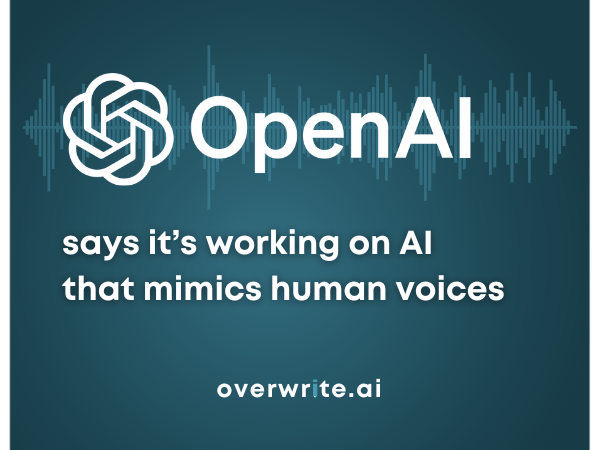
Ayman Alashkar, Founder & CEO of overwrite was on Dubai Eye 103.8 , he highlighted the urgent need to address the threat of deep fake misinformation.
Reflecting on recent events, Ayman Alashkar highlighted the spread of deep fake misinformation in the Chicago elections last year, where a candidate’s voice was synthesized using advanced technology just before the vote. Are we to now expect similar malicious acts in the Democratic voting systems of these countries? That represents 4 billion people. Ayman Alashkar stressed the importance of people being able to recognize and address fake news, urging policymakers to develop strategies to counter its influence on electoral processes.
By Clare Duffy, CNN
OpenAI has unveiled a new artificial intelligence tool that can mimic human voices with startling accuracy. The AI voice generator has a range of potential applications, including for accessibility services, but could also prompt concerns about misinformation and other forms of abuse.
OpenAI on Friday shared samples from early tests of the tool, called Voice Engine, which uses a 15-second sample of someone speaking to generate a convincing replica of their voice. Users can then provide a paragraph of text and the tool will read it in the AI-generated voice.
An AI-enabled text-to-voice tool could help with translation, reading assistance for children or aiding people who have lost the ability to speak, the company says. But some skeptics worry it could also fuel the creation of disinformation or make it easier to perpetrate scams.
OpenAI says Voice Engine is currently being used by only a “small group of trusted partners,” including education and health technology companies, and it will use their tests to determine whether and how to allow more widespread use. Those testers have agreed not to recreate people’s voices without their explicit consent and to clearly identify to listeners that what they’re hearing is AI-generated, according to the company.
“We recognize that generating speech that resembles people’s voices has serious risks, which are especially top of mind in an election year,” OpenAI said in a blog post. The company acknowledged the need for major changes as AI-generated audio becomes more widely available, although it doesn’t plan to release Voice Engine to the public immediately. For example, the company suggested phasing out voice-based authentication for bank accounts.
“Any broad deployment of synthetic voice technology should be accompanied by voice authentication experiences that verify that the original speaker is knowingly adding their voice to the service and a no-go voice list that detects and prevents the creation of voices that are too similar to prominent figures,” OpenAI said.
Voice Engine can use a voice sample in one language to create a replica voice that can speak in multiple other languages.
Its blog post includes an example of an audio clip of a human reading a passage about friendship, alongside AI-generated audio that sounds like the same person reading the same passage in Spanish, Mandarin, German, French and Japanese. In each of the AI-generated samples, the tone and accent of the original speaker is maintained.
Click here for audio samples from OpenAI that show how Voice Engine works. The first audio clip is the real human speech that was used was the input for the tool.
This column does not necessarily reflect the opinion of overwrite.ai and its owners.
This story has been published from an article in CNN published on April 2024.
For informative news and views on the world of real estate, proptech and AI, follow overwrite on Instagram and LinkedIn, and keep up-to-date with our weekly NewsBites blog
overwrite | real estate content creation, reimagined
For Full Article: https://edition.cnn.com/2024/04/01/tech/openai-ai-voice-generator-tool-voice-engine/index.html